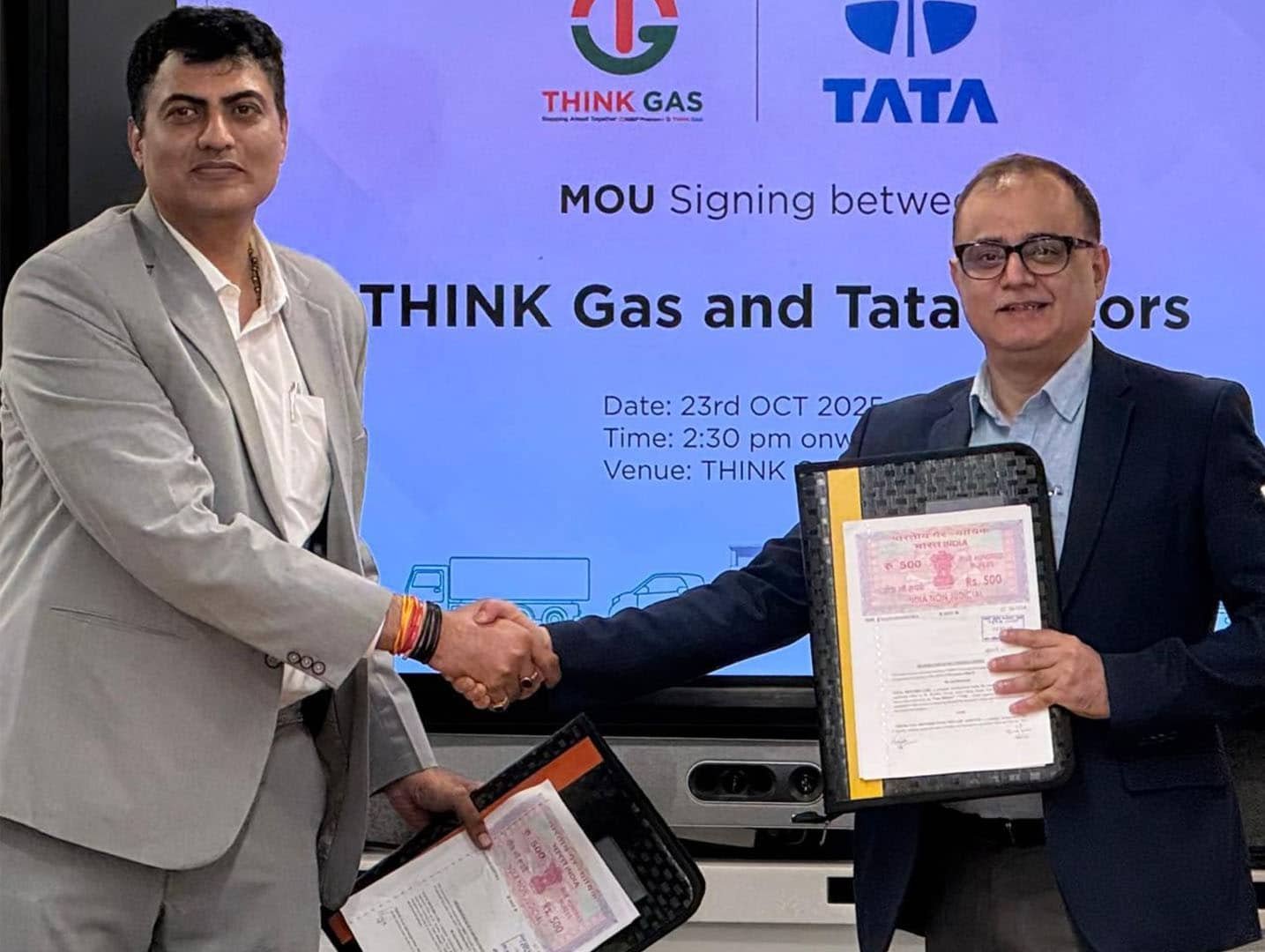News List
Tata Motors Partners with THINK Gas to Strengthen LNG Infrastructure for Commercial Vehicles

In a move to advance cleaner and more sustainable freight transportation, Tata Motors, India’s largest commercial vehicle manufacturer, has partnered with THINK Gas to develop liquefied natural gas (LNG) infrastructure for long-haul trucks. The memorandum of understanding (MoU), signed on October 30, 2025, marks a key milestone in Tata Motors’ strategy to promote alternative fuel technologies in the country’s logistics ecosystem.
Under the collaboration, the two companies will work together to identify strategic freight corridors and logistics hubs for setting up LNG refueling stations. THINK Gas, supported by investors such as I-Squared Capital, Osaka Gas, and Sumitomo Corporation, will oversee the establishment of LNG facilities, ensuring fuel quality, reliable supply, and preferential pricing for Tata Motors customers.
LNG is emerging as a promising alternative to diesel for medium and heavy-duty commercial vehicles, thanks to its higher energy density and lower emissions. Trucks powered by LNG can travel up to 1,000 kilometers on a single refuel, producing 30% less carbon dioxide and significantly fewer particulate and nitrogen oxide emissions than conventional diesel engines.
India’s LNG trucking segment, though small, is growing steadily. The country currently operates around 1,500 LNG-powered trucks, compared to the 300,000 diesel units sold annually. The Ministry of Petroleum and Natural Gas has announced plans to develop 1,000 LNG stations along major highways and industrial belts, with 49 stations already in progress through state-run oil companies. The government targets 33% of India’s trucking fleet to operate on LNG by 2030.
Rajesh Kaul, Vice President and Business Head for Trucks at Tata Motors, said the partnership reflects the company’s commitment to building sustainable transport solutions. “LNG offers a viable path for long-distance freight movement, combining range, performance, and lower emissions,” he noted.
Somil Garg, Senior Vice President at THINK Gas, emphasized that the collaboration would accelerate the company’s network expansion. THINK Gas currently runs 18 LNG and CNG stations and is developing new facilities to link industrial and agricultural hubs across the country.
The move comes amid intensifying competition in India’s emerging LNG truck market. Companies like GreenLine Mobility Solutions and Blue Energy Motors, both associated with the Essar Group, have been early adopters. GreenLine already operates a majority of LNG trucks in India and plans to deploy 5,000 units by March 2025, while Blue Energy Motors launched the country’s first LNG trucks in 2022. Other players, including Volvo, Ashok Leyland, Adani Total Gas, and Indraprastha Gas, are also entering the space with plans for new retail stations and LNG-ready models.
Despite the growth potential, challenges remain. High vehicle costs—averaging around ₹85 lakh per LNG truck—and limited refueling infrastructure continue to constrain adoption. Most LNG terminals are currently located in Gujarat, Maharashtra, Kerala, and Tamil Nadu, and financing options for such vehicles are still limited. Analysts say expanded infrastructure, along with policy incentives like tax reliefs or dedicated freight lanes, could speed up adoption.
Part of the $180 billion Tata Group, Tata Motors holds a 42% share in India’s commercial vehicle market and offers a wide portfolio spanning electric, CNG, LNG, hydrogen internal combustion, and fuel-cell vehicles. The partnership with THINK Gas comes right after the company’s corporate restructuring, with its commercial vehicle division now operating as Tata Motors Limited, following its renaming on October 29, 2025.
As medium and heavy commercial vehicles consume nearly 40% of India’s diesel, the shift toward LNG could play a decisive role in cutting emissions and reducing the nation’s oil import bill by $1.5 billion by 2032, according to industry estimates.
